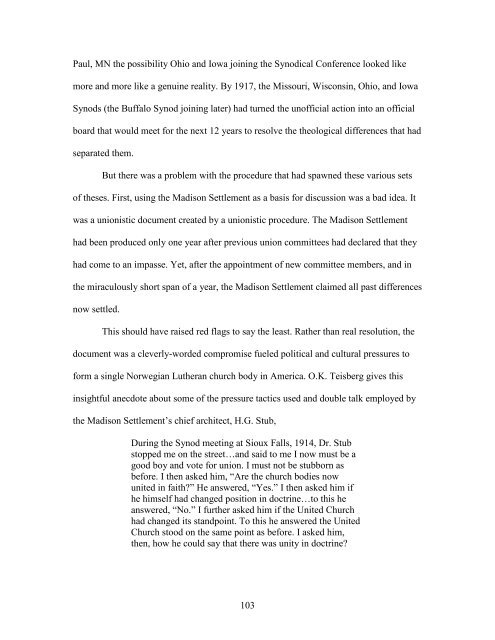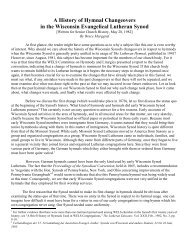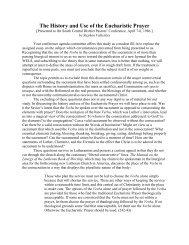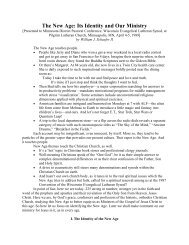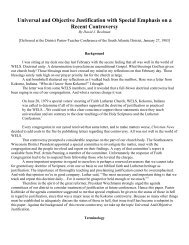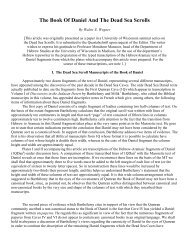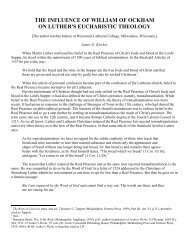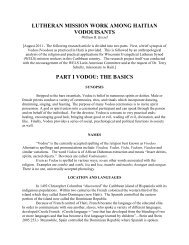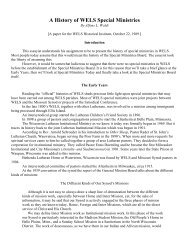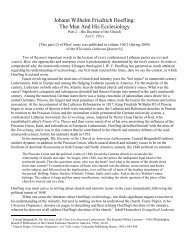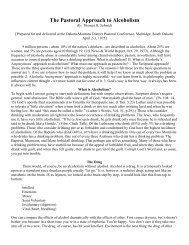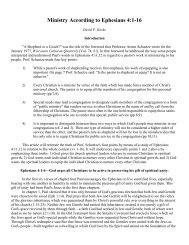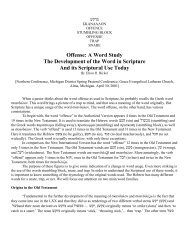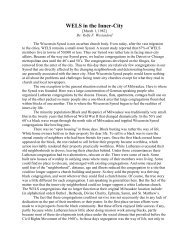Strangers to Sisters - Wisconsin Lutheran Seminary Library: Essays
Strangers to Sisters - Wisconsin Lutheran Seminary Library: Essays
Strangers to Sisters - Wisconsin Lutheran Seminary Library: Essays
You also want an ePaper? Increase the reach of your titles
YUMPU automatically turns print PDFs into web optimized ePapers that Google loves.
Paul, MN the possibility Ohio and Iowa joining the Synodical Conference looked like<br />
more and more like a genuine reality. By 1917, the Missouri, <strong>Wisconsin</strong>, Ohio, and Iowa<br />
Synods (the Buffalo Synod joining later) had turned the unofficial action in<strong>to</strong> an official<br />
board that would meet for the next 12 years <strong>to</strong> resolve the theological differences that had<br />
separated them.<br />
But there was a problem with the procedure that had spawned these various sets<br />
of theses. First, using the Madison Settlement as a basis for discussion was a bad idea. It<br />
was a unionistic document created by a unionistic procedure. The Madison Settlement<br />
had been produced only one year after previous union committees had declared that they<br />
had come <strong>to</strong> an impasse. Yet, after the appointment of new committee members, and in<br />
the miraculously short span of a year, the Madison Settlement claimed all past differences<br />
now settled.<br />
This should have raised red flags <strong>to</strong> say the least. Rather than real resolution, the<br />
document was a cleverly-worded compromise fueled political and cultural pressures <strong>to</strong><br />
form a single Norwegian <strong>Lutheran</strong> church body in America. O.K. Teisberg gives this<br />
insightful anecdote about some of the pressure tactics used and double talk employed by<br />
the Madison Settlement’s chief architect, H.G. Stub,<br />
During the Synod meeting at Sioux Falls, 1914, Dr. Stub<br />
s<strong>to</strong>pped me on the street…and said <strong>to</strong> me I now must be a<br />
good boy and vote for union. I must not be stubborn as<br />
before. I then asked him, “Are the church bodies now<br />
united in faith?” He answered, “Yes.” I then asked him if<br />
he himself had changed position in doctrine…<strong>to</strong> this he<br />
answered, “No.” I further asked him if the United Church<br />
had changed its standpoint. To this he answered the United<br />
Church s<strong>to</strong>od on the same point as before. I asked him,<br />
then, how he could say that there was unity in doctrine?<br />
103


